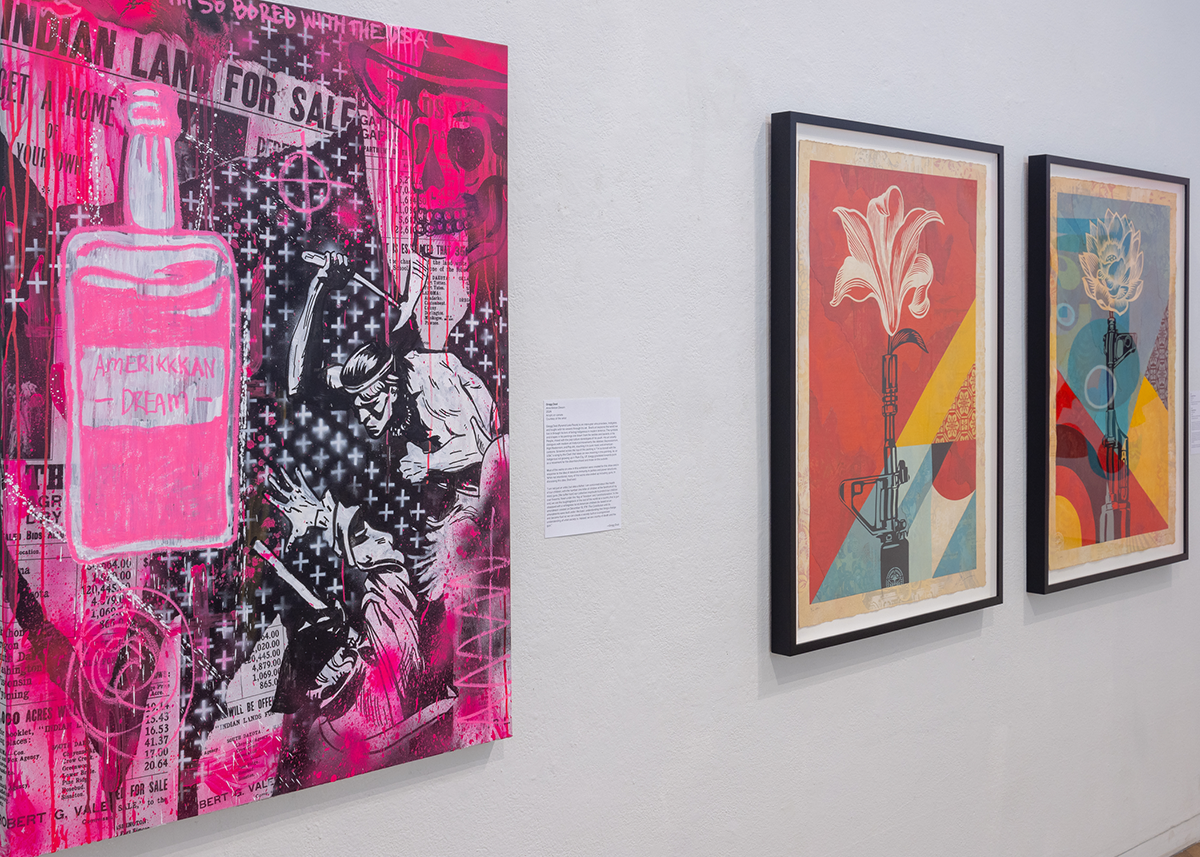
Kenzie Bruce

Audio By Carbonatix
In 2008, when Denver hosted the Democratic National Convention, police arrested 154 people in the Mile High City, most of whom were involved in various protests around Denver. One of them was world-famous contemporary street artist Shepard Fairey, perhaps best-known for his Barack Obama “HOPE” poster that became an iconic image in the campaign of the man who was nominated at that convention, offered his acceptance speech at a massive ceremony at Mile High Stadium, and was elected the 44th president of the United States that November.
After his arrest, though, Westword wondered if Fairey would ever return to the Mile High City.
Not to worry. Fairey continued to come to Denver for projects like his 2012 mural on the side of the Center for Visual Art on Santa Fe Drive, his 2018 “Power & Equality” mural in RiNo, and work with the Museum of Contemporary Art and Black Book Gallery.
Next week, Fairey will be back in Denver again, this time for a conversation with revered Colorado punk band Dead Pioneers frontman and Indigenous activist artist Gregg Deal. Their talk on Tuesday, May 6, is presented by the University of Colorado Denver at the King Center Concert Hall, and it is free to attend.
Fairey and Deal have known each other for almost fifteen years; they met when Fairey worked on some fundraising and imagery for an initiative called Honor the Treaties, which was started by Aaron Huey, the photographer behind the Amplifier foundation. Amplifier’s exhibition, Reframe: Augmented Reality, is an immersive display featuring twelve dynamic posters brought to life using augmented reality currently on display at Colorado State University in Fort Collins.
“Gregg was part of the group of Native American artists who were contributing to that and also having projects of theirs funded by it,” Fairey says. “I really like Gregg’s work a lot and I like him a lot, so we ended up staying in touch and doing several things since then.”
One of those projects was last year’s Absolute Immunity exhibit at the Emmanuel Art Gallery on the Auraria Campus.

Work by Gregg Deal and Shepard Fairey in Absolute Immunity.
Paul Wedlake
Fairey hopes the talk will inspire people to use their voices in a constructive and meaningful way in today’s chaotic world. “I think human beings are social creatures. Whether we’re consciously aware of it or willing to admit it, we want validation from other people,” Fairey says. “Culture is a way of changing people because people want to fit in with the way other people live their lives, the way they send signals, think and dress.”
Art is a great way to push back, he adds: “When that happens, it creates space for people who are afraid to speak up because they don’t want to be the only one. It makes space for them to use their voice and feel like they’re not alone.”
Fairey, who was born in South Carolina and currently lives in L.A., was fourteen when he started exploring this space, inspired by punk rock and skateboarding. “It started to slowly build up an idea that creativity could be used to say something in a powerful way,” he recalls.
He went to art school at the Rhode Island School of Design and did some works there that focused on freedom of speech and racism – “There was a big white power skinhead faction in punk rock that I was disgusted by,” he recalls – as well as control of public space, surveillance and more. “I got more courageous, more topical, more bold after Bush was elected in 2000,” he says.
Art, whether visual art, music, film or something else, has the power to bring out the best in people because it’s vulnerable and communal, Fairey says: “I think that the more people not just consume and criticize from a distance, the more they get into the creative process, the more they will have empathy and see the importance of healthy dynamics with others.”
While Fairey found a lot of inspiration in punk rock, visual art was the way he decided to take action. “Coming from punk rock, where there’s a lot of this anti, anti, anti, the way I’ve perceived it and the way I’ve evolved is you first have to have your eyes open enough to diagnose the problem, speak out about it and then try to find the solution,” he says. “I don’t think you can stop at just the punk-rock-everything-sucks-I’m-angry-yelling. It’s gotta have the next phase after that.”
When he’s protesting against something, Fairey notes, he makes sure that it’s for the sake of the greater good; he looks for ways to find common ground with others and be more accepting of people. Of course, there are forces that are dividing us, he adds; one of them is the MAGA crowd, but another big one is social media.
“The social media algorithms themselves are designed to maximize engagement by stoking a lot of emotion,” Fairey says. “Most of those emotions are anger, placing blame, scapegoating, othering and a lot of conspiracy theories that go with that.”
Fairey is considering all of this for his talk with Deal, since a lot of college students will be in attendance. He hopes that the work he and Deal have done will inspire people to use their voices creatively. “I think that a lot of younger people are looking at success through a distorted lens because social media has accelerated our cultural metabolism in such a degree that people feel alone and rejected if an idea they put out into the world through that medium doesn’t get the likes and comments they want,” he says.
“Having a powerful voice is a longer game than that.”
See Shepard Fairey and Gregg Deal, “Emanuel Art Gallery Conversation,” 3 p.m. Tuesday, May 6, at the King Center Concert Hall, 855 Lawrence Way. Register online for a free spot.